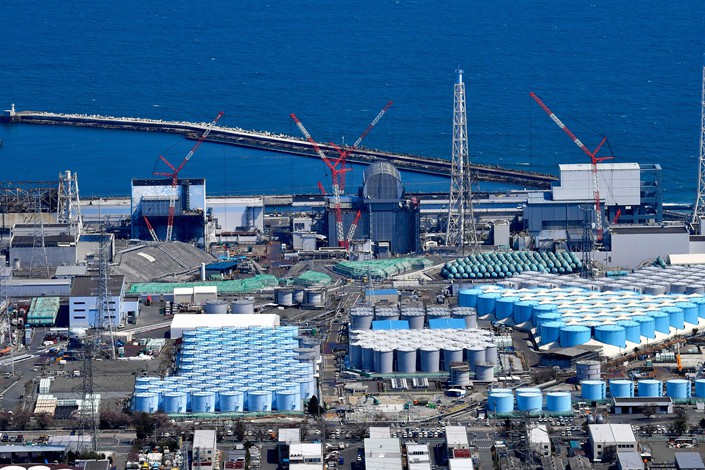South Korea Weighs Fighting Fukushima Water Plan at Tribunal

Nikkei Asia — Japan’s plan to release treated water from the crippled Fukushima Daiichi nuclear plant into the sea is creating further tensions between Tokyo and Seoul — two U.S. allies embroiled in various disputes over historical issues.
A day after the decision to discharge the water, South Korean President Moon Jae-in on Wednesday asked his secretaries to consider filing a complaint against Japan with the International Tribunal for the Law of the Sea (ITLOS).
Moon told Japanese Ambassador Koichi Aiboshi of his concerns after accepting a letter of credence from the new envoy.
“The Republic of Korea is concerned very much over the decision to release nuclear plant [water] because we are the closest geographically and share the ocean,” Moon told Aiboshi. “You may know this worry of the Korean government and people. I hope that you tell this to your country well.”
Kang Min-seok, Moon’s spokesman, said that the remarks were “very unusual” as it was supposed to be a casual conversation.
A senior official at the presidential Blue House said that the office is reviewing many options including filing a petition with the ITLOS to stop Japan’s release of the water.
Japanese experts have deemed that the water containing tritium, a radioactive form of hydrogen, is scientifically safe. Other nuclear plants in Japan and in countries including South Korea release the same kind of water into the sea.
Japan’s regulations allow water containing 60,000 becquerels of tritium per liter to be released from ordinary nuclear facilities into the ocean. That is based on recommendations from the International Commission on Radiological Protection. When Tokyo Electric Power Co., the operator of the Fukushima plant, releases treated water, it will be diluted more than 100-fold using seawater to ensure it contains fewer than 1,500 becquerels of tritium.
“[Releasing] the treated water is an unavoidable task to decommission the Fukushima Daiichi Nuclear Power Plant and reconstruct the Fukushima area,” Japanese Prime Minister Yoshihide Suga said on Tuesday.
Analysts say that the South Korean government needs to look at the bigger picture.
“I don’t think this is a bilateral diplomatic issue between the two countries. It should be discussed at the level of a global environmental issue,” Lee Won-deog, a professor of Japanese studies at Kookmin University, told Nikkei Asia.
Bilateral relations between Seoul and Tokyo are already at a very low point. Courts in Seoul are ordering Japanese companies to pay compensation to Koreans forced to work for Japanese during World War II. Other issues dog the relationship, including the so-called comfort women who served the Japanese military in wartime brothels, as well as friction over the sovereignty of small islands in the Sea of Japan.
The Chinese mainland and Taiwan were also angered by Japan’s decision to discharge the water. China’s Ministry of Foreign Affairs issued a statement on Tuesday calling the decision “extremely irresponsible,” saying it reserves the right to make a further response.
However, the U.S. supported Japan’s decision, saying it was made in close coordination with the International Atomic Energy Agency.
“In this unique and challenging situation, Japan has weighed the options and effects, has been transparent about its decision, and appears to have adopted an approach in accordance with globally accepted nuclear safety standards,” Ned Price, spokesperson for the U.S. State Department, said in a statement.
Immediately after the 2011 accident at the Fukushima plant, contaminated water containing more radioactive material than permitted leaked into the sea on several occasions.
South Korea imposed a ban in 2013 on the import of marine products after there was a one-month delay making a public announcement that contaminated water had leaked into the sea.
In 2019, the World Trade Organization upheld South Korea’s ban on seafood from areas affected by Japan’s 2011 Fukushima nuclear disaster.
This story was first published by Nikkei Asia
Contact editor Michael Bellart (michaelbellart@caixin.com)
Download our app to receive breaking news alerts and read the news on the go.
Follow the Chinese markets in real time with Caixin Global’s new stock database.

- MOST POPULAR





